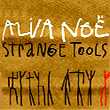Monday, 10 September 2012
Why You Are Not Just Your Brain
 In the introduction to their 1991 book The Embodied Mind, Francisco Varela, Evan Thompson, and Eleanor Rosch noted that as of that writing, the cognitive sciences had little to say about what it means to be human in the concrete situations of everyday life. This criticism was aimed directly at the prevailing paradigm, according to which the human brain worked somewhat like a computer, with input, information processing, symbolic representation, output, and so on.
In the introduction to their 1991 book The Embodied Mind, Francisco Varela, Evan Thompson, and Eleanor Rosch noted that as of that writing, the cognitive sciences had little to say about what it means to be human in the concrete situations of everyday life. This criticism was aimed directly at the prevailing paradigm, according to which the human brain worked somewhat like a computer, with input, information processing, symbolic representation, output, and so on.
In contrast, the approach proposed by Varela and his colleagues, to which they gave the name “enaction”, emphasizes how much our reasoning depends on our bodies and on the environmental context in which they are situated.
This conception of thought as “embodied” thus involves not only the human brain, but also its dynamic relationship with the rest of the body, as well as the relationship between this brain/body system and the environment in which it operates.
Alva Noë, a philosophy professor at the University of California at Berkeley, studies the nature of perception and consciousness from this perspective of enaction. Though recognizing the undeniable, necessary contributions of neuroscience to our understanding of the human mind, Noë invites us to “get out of our heads” (from the title of his 2009 book, Out of Our Heads: Why You are Not Your Brain and Other Lessons from the Biology of Consciousness) and to realize just how closely our brain processes are interlinked with our environment.
From March 17 to 19, 2011, Alva Noë went in Montreal, Quebec, Canada to deliver a series of three lectures, one of which was preceded by a day-long symposium on his work.
![]() Announcement for lectures by Alva Noë in Montreal, March 17 to 19, 2011
Announcement for lectures by Alva Noë in Montreal, March 17 to 19, 2011
![]() Alva Noë’s Web Site
Alva Noë’s Web Site
![]() 2009 Interview with Alva Noë: You are not your brain
2009 Interview with Alva Noë: You are not your brain
![]() 2008 Interview with Alva Noë: Life is the way the animal is in the world
2008 Interview with Alva Noë: Life is the way the animal is in the world
![]() Video of Noë presenting his book Out of Our Heads
Video of Noë presenting his book Out of Our Heads
![]() In search of the enactive: Introduction to special issue on enactive experience
In search of the enactive: Introduction to special issue on enactive experience
Body Movement and the Brain, The Emergence of Consciousness | Comments Closed







